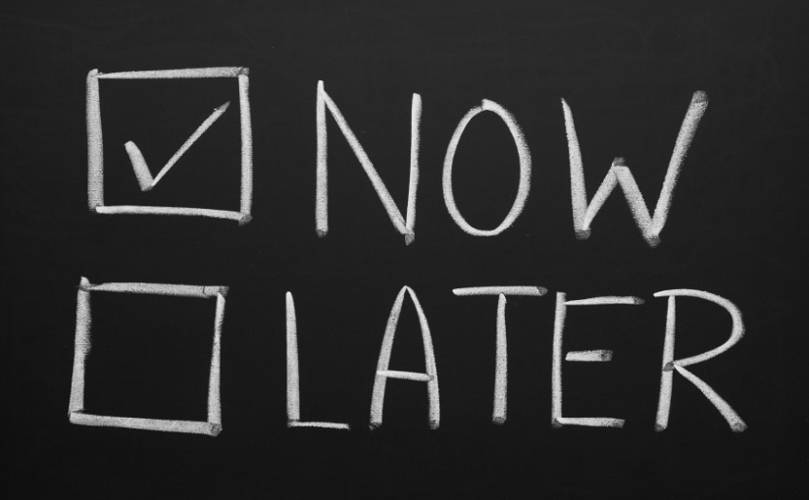I have a confession to make. I tend to procrastinate. Especially when I have a big project to do, I can find all kinds of things that prevent me from starting when I’m supposed to. Why is it when a big, research-intense article is due, for example, I suddenly have a powerful urge to clean out my closet, go for a walk, or train my puppy?
At least I know I’m not alone. All of us procrastinate from time to time, and around 20% of adults or 1 in 5 of us regularly procrastinate. And if you’re a college student, the numbers are even more alarming: between 80 and 95% of students regularly procrastinate, especially when it comes to coursework. 1
BREAKING: Doctors Can't Believe She Used This To Erase Her Wrinkles...
The big question then, at least for those of us who procrastinate, is, why? And more importantly, how can we stop procrastinating and get things done?!
What is Procrastination?
Experts define procrastination as “the ‘voluntary’ delay of some important task that we intend to do, despite knowing we’ll suffer as a result.” (The quotations around voluntary are mine as sometimes procrastination doesn’t feel voluntary—especially when you’re fighting so hard against it!) Others define it as “the absence of progress” or the “thief of time.”
It can result from (or be made worse by) struggling to manage emotions. In other words, negative emotions like self-doubt, anxiety, boredom, frustration, fear of failure, or feeling overwhelmed can lead to procrastination.
As a professor of psychology at DePaul University and APS Fellow Joseph Ferrari, explains, “It really has nothing to do with time-management. As I tell people, to tell the chronic procrastinator to just do it would be like saying to a clinically depressed person, ‘cheer up.’” 2
What’s Wrong With Procrastination?
Procrastination is nothing new—it didn’t start with the internet, email in-boxes, or social media (though they all make it so much easier to procrastinate, don’t they?). Way back in 800 B.C., the Greek poet Hesiod warned not to “put your work off till tomorrow and the day after.” And notable Roman stoic Cicero called procrastination “hateful.”
Harsh words indeed. But we know that procrastination can be genuinely harmful. Sure, some folks think procrastination is annoying at worst and “helpful” at best, believing that as long as something gets done, it doesn’t really matter when. Or they may even believe they actually work their best when faced with the intense pressure of a pending deadline.
Yet the reality is folks who put things off tend to experience higher levels of stress and have lower well-being. Procrastination can result not just in missed deadlines but fewer promotions and raises, late bill payments (and lower credit), lower retirement savings, and more severe medical issues due to putting off seeing the doc or pushing off that healthy exercise and nutrition plan until after a health issue develops.
And that’s not even mentioning the opportunity costs, fines paid, and overpayment, for example, on taxes that were rushed to meet the April 15th deadline. (Do you really think you got all of the deductions you could when you started doing your taxes on April 14th?)
Research on students has found similar results. Those students, for example, who put off their work for more pleasant activities earned lower grades and had higher stress and illness, especially later in the semester. Yes, they finished their work, but both the quality and their well-being suffered. 2
In other words, procrastination leads to increased suffering and worse performance, along with the bonuses of added guilt, shame, and anxiety from the decision to delay. It’s a “self-inflicted wound that gradually chips away at the most valuable resource in the world: time.” 2
So, Why Do We Procrastinate?
If procrastination is so harmful, why do we do it? In another study, researchers brought in students to do a math puzzle. They told some students it was to test cognitive abilities, and others were told it was just for fun. Then they gave the students a chance to prepare for the task or play games like Tetris.
The students that had previously been found to be chronic procrastinators delayed practicing for the math puzzle only if they thought it was going to test their cognitive abilities. If they thought it was just for fun, they performed the same as the other students.
The researchers thus concluded that procrastination is a “self-defeating behavior.” 2
However, there isn’t one type of procrastinator. Chronic procrastinators have a hard time finishing tasks, while situational procrastinators tend to delay based on what the task is. In other words, if you want a strong chance of procrastination, give a difficult or unpleasant task to someone who has low self-discipline and high impulsivity.
At the end of the day, procrastination is basically a breakdown in self-control or self-regulation. “You know what you ought to do and you’re not able to bring yourself to do it,” explains Timothy Pychyl of Carleton University. 2
This can come down to a fear of failure, perfectionism, or simply temptation of something “better”—at least in the moment.
Some have suggested it’s a lack of time management; however, the role of mood and emotions cannot be overlooked. Procrastination is often a coping mechanism to avoid negative emotions. Plus, research has found that when people procrastinate, they feely guilty as they recognize the harm that comes from the behavior. Pychyl concluded, “Emotional regulation, to me, is the real story around procrastination, because to the extent that I can deal with my emotions, I can stay on task.” 2
So contrary to popular belief, procrastination isn’t the result of poor time management or laziness. 3 And even the best time-management tool can’t solve it.
Chronic Procrastination and Fighting the Future
Again, everyone procrastinates from time to time. Yet most folks learn their lessons and change their approaches to help them push past procrastination (at least most of the time). Those who regularly procrastinate don’t seem to learn from the mistakes. And they’re more likely to have the false belief that they’ll be better equipped to handle the situation at some future date. For example, procrastinators tend to use excuses like:
- “I’m sure I’ll want to work on this tomorrow.”
- “I’m better under pressure.”
- “I’ll do it later when I have more time, energy, etc.”
- “Why bother? I can never get it all done anyway.”
- “It’s too late to start on that now. I’ll wait until tomorrow.”
Sadly, in their search to relieve their stress by putting off a task, they actually prolong the situation, make it worse, and increase the stress. 2 No matter what you tell yourself, you’re probably not going to want to do whatever you’re putting off till tomorrow any more than you do today. And you’ll probably want to even less…
How Can We Stop Procrastinating?
Finally, some good news… Yes, it is possible to train yourself to stop procrastinating (at least much of the time)! But it takes some work and commitment, especially if you are a chronic procrastinator. Yet when applied (especially consistently), the tips on this list can help anyone who feels stuck or just can’t seem to get started working on that oh-so-challenging project or task.
1) Assess. Honestly recognize when you’re trading in long-term results for short-term pleasure. It may not be easy to be this honest with yourself, but acknowledging there is a problem is the first step toward fixing it. You need to know your obstacles before they can be overcome.
2) Take action. I understand—right now just isn’t the right time. You’re tired, it’s late in the day, you need another cup of coffee first… Let me stop you right there. You won’t always want to do ____ (whatever it is that you’re putting off). But it’s okay to get started even when you don’t feel like it. Chances are pretty good that you may never feel like it. But your emotions don’t determine your actions. You do.
Fortunately, once you start taking action, that’s when good things begin to happen. As Dale Carnegie said, “Inaction breeds doubt and fear. Action breeds confidence and courage. If you want to conquer fear, do not sit home and think about it. Go out and get busy!”
Just getting started can immediately relieve the negative thoughts and emotions you had about, well, starting. And once you get started, you’re more likely to keep going. To finish any task, all you have to do is keep on starting.
3) Block. If you have a hard time dealing with digital distractions (who doesn’t?), ironically, there’s an app for that. Apps for the phone and computer like Freedom, RescueTime, and FocusMe can help you see how you are spending time and/or limit the time you spend on specific sites (yep, we’re talking about you, social media). You can also turn off notifications or shut down your emails for specific focus sessions.
Or, you can try keeping your phone in a separate room, a desk drawer, or your bag, or switching to airplane mode, so it’s not as easy to get distracted in the first place.
4) Break it down. One common reason we procrastinate is because we’re feeling overwhelmed, especially when there’s a big project involved. We’ve all heard the saying, “How do you eat an elephant? One bite at a time.” Personally, I can’t imagine eating an elephant (they’re such amazing creatures!); however, the point of breaking down a challenging task into smaller, more manageable steps is very effective. Focus on the next concrete step, not the next hundred steps, and then take action.
5) Start with the hard stuff. Fighting with your pleasure-seeking brain can be hard, and it’s even harder when you put it off because we have only so much willpower. Starting with the hardest task for you on your to-do list means you’re using your limited energy and discipline while you’re still fresh and alert to give yourself the upper hand. Bonus: once you conquer the biggest, worst job on your list, you’ll feel more productive, which fills you with positive energy, so you can accomplish even more.
6) Pre-commit. Set a meaningful deadline for yourself and commit in advance to meet it. Even better, decide on when, where, and how you’ll accomplish the task. For example, if you’ve been putting off eating healthier foods, use your calendar to schedule something like, “On Saturday at 9:30 a.m., make a menu and meal plan using The 3-Week Diet plan as a guide. Go grocery shopping at 10:00 a.m., and start food prep at 11:00 a.m.”
As the saying goes, “If it doesn’t get scheduled, it doesn’t get done.”
7) Be accountable. Find someone to help hold you accountable—preferably someone you don’t want to let down but who doesn’t also increase your stress levels.
8) Connect. By connecting with the deeper meaning of a task, you’ll remember why it’s so important to your future growth and health. When you find out why the task is worthwhile, positive, and rewarding in itself, it’s easier to say no to the distractions. 3
9) Reset. Have you found yourself meandering through your day—or has the day already gotten away from you? Restart your day again at 12:00 or 2:00 p.m. A mid-day reboot gives you a chance to reassess how the day has gone so far and to help you refocus on what’s most important. Go ahead and have another cup of coffee or tea if that enables you to reset and start again.
10) Use a timer. Anyone can do something for 2 or 10 minutes, so if you are putting off a difficult task, grab a timer and set it, and focus for just those minutes. You may get engrossed and work for much longer, or you may take a few minutes break and then go back for another set. But at least you got started and made progress!
11) Drop your standards. If you think you have to be perfect, you’ll not only set yourself up for procrastination but for failure. The higher your standards and the more difficult the task, the harder it is to get started. Say, for example, you are ready to start meditating. If you decide that you need to meditate for a full hour (or even a full 20 minutes), it can scare you out of ever starting. What to do instead? Start for just one minute.
If you have been avoiding going to the gym because you don’t have time for a full hour workout, put on your gym clothes and just walk into the gym for a five-minute workout. Once that’s done, you’ve accomplished your goal. You can choose to stay longer or turn around and head home. Either way, count it as a win as you’re now overcoming that resistance to get that ball rolling.
In Atomic Habits, James Clear recommends the “2-Minute Rule.” With any new habit, he recommends making sure it takes less than two minutes. “For example, do 30 minutes of yoga becomes take out my yoga mat. Run three miles becomes tie my running shoes.” 4
What makes this so powerful is that anyone can do it. Two minutes are easy. But those minutes are a gateway. That is, once you’ve gotten started, it’s so much easier to keep going.
The point is not to do just those two minutes but rather to simply keep showing up because, as Clear says, “A habit must be established before it can be improved.” And “It’s far better to do less than you hoped than to do nothing at all.” 2
12) Create clear rewards. It’s easy to put off a task that feels irrelevant, boring, challenging, frustrating, or causes anxiety. To make tasks more appealing, use rewards or turn them into games. For example, if you have a job that bores you to death, make a game of seeing how quickly you can get it done (well). Can you beat last time?
Or try tying your unwanted task with another activity you truly enjoy. For example, listen to your favorite podcast only during your workout. Watch your favorite TV show only when you’re stretching, doing the dishes, or another obligation you prefer to put off.
13) Make a day of it. Do you have some pesky tasks that have been languishing on your to-do list for far too long? Put all of them together for a full day of serious productivity. Vow to get everything on the list done come heck or high water and plan mini-rewards (like your favorite coffee or tea, a walk in the park, or a good stretch) throughout the day for each time you knock a few of the items off the list.
14) Forgive yourself. Accountability and even “tough love” are recommended for others who tend to fail due to their procrastination. But when it comes to looking at yourself and your own procrastination, one of the best things you can do is forgive yourself. In the study found in Personality and Individual Differences, students who gave themselves a break for delaying studying on the first exam were actually less likely to delay when it came time for the next exam. 2
In other words, forgiveness, rather than guilt, is what can help you get back on track.
15) Optimize. When you’re exhausted, your chances of self-regulation go waaay down. So, optimizing your health and energy levels is another key to overcome a procrastination problem.
How do you do that? By following a healthy eating plan made up of healthy whole foods, exercising on the regular, and making sure you are getting enough sleep. Not only will this ensure your energy levels are optimized, but it will also help you increase your self-control and positively affect every area of your life.
According to Kelly McGonigal in her book The Willpower Instinct, “Exercise turns out to be the closest thing to a wonder drug that self-control scientists have discovered.” And the effects are immediate. Just 15 minutes on a treadmill can reduce cravings for food or cigarettes (for smokers obviously). And the long-term effects are even better.
How to Stop Procrastinating: A Recap
Procrastination doesn’t just steal away time. It takes away happiness, health, success, and the things that truly provide meaning in life. Now that you have some tools to stop procrastination, what are you waiting for? Pick the strategies that resonate with you most, and get busy living your life rather than letting it slip away (and feeling guilty about it).
TRENDING: This Keeps Your Blood Sugar Below 100 - Even When You're Eating Sweets!
Will these tools and strategies completely stop procrastination for all time? Sorry, but no. There will still be times when you’ll have to face this challenge or realize you’re stuck watching online videos on subjects you have absolutely no interest in—wondering how you got there.
Fortunately, the more you practice getting started, the better you’ll get. And the less you’ll procrastinate and beat yourself up about it.









